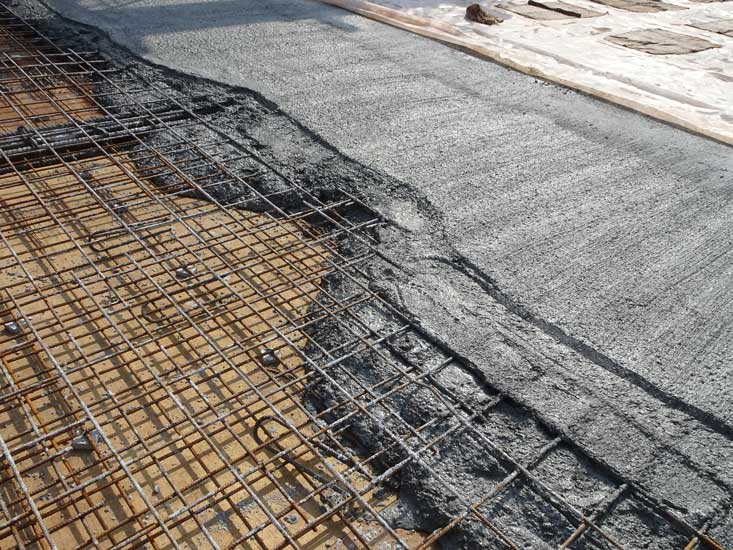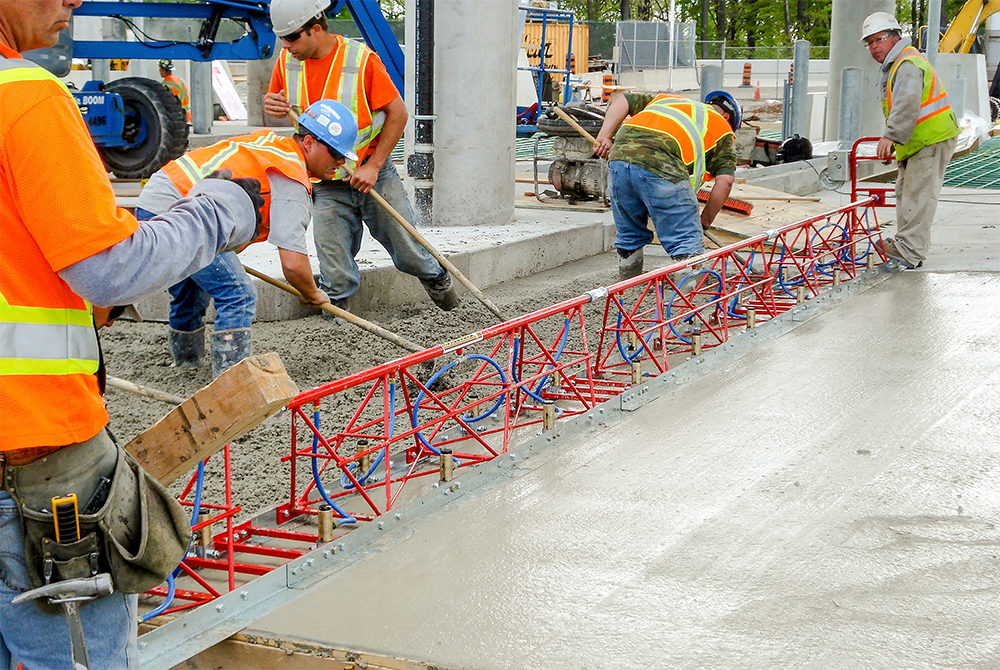5 Questions You Must Ask Your West Coast GE Concrete contractors Before Breaking Ground
5 Questions You Must Ask Your West Coast GE Concrete contractors Before Breaking Ground
Blog Article
The Important Function of Concrete Foundation in Structural Stability and Durability
When it pertains to constructing a property, the foundation is much more vital than you may believe. Concrete structures supply unmatched strength and resilience, ensuring your structure can withstand various environmental difficulties. Without a strong base, you take the chance of possible concerns like changing or fracturing, which can endanger safety and security and worth. Recognizing the subtleties of concrete structures can be the key to protecting your investment for many years ahead. So, what should you take into consideration following?
Recognizing the Relevance of Concrete Foundations
Concrete foundations are vital to the overall stability of any structure, as they offer the necessary assistance required to hold up against different loads and environmental conditions. When you think of constructing a home or a commercial room, the structure is the initial point you must think about. It acts as an obstacle versus moisture, protecting your home from water damage. A well-placed concrete structure additionally prevents settling and changing, which can cause cracks in wall surfaces and floorings. You'll want to guarantee that the structure is correctly made and strengthened, as this affects the long life of your building. In addition, a solid structure can enhance energy efficiency by minimizing air leaks. Bear in mind, neglecting the relevance of a concrete foundation can bring about costly repairs down the line. So, buying a quality structure upfront is vital for the integrity and toughness of your framework.
Benefits of Concrete Foundations for Architectural Integrity
While numerous variables contribute to a building's structural stability, concrete foundations use unmatched sturdiness and toughness. You'll value that concrete can withstand extreme weather, standing up to both moisture and temperature level variations. This resilience implies your framework is less likely to experience fracturing or shifting in time, which can compromise its safety.Additionally, concrete's fundamental weight provides a strong base, avoiding activity throughout natural occasions like quakes or floods. When you select a concrete structure, you're also selecting reduced upkeep; unlike timber, it will not rot or attract bugs, saving you time and cash in repairs.Moreover, concrete's fire resistance provides added safety and security, ensuring your structure can endure heats without significant damage. On the whole, purchasing a concrete structure means you're prioritizing the lasting stability and stability of your building, making it a smart option for any kind of construction project.
Common Sorts Of Concrete Foundations
When it concerns developing foundations, comprehending the typical kinds of concrete structures can aid you make informed selections for your task. The most common types consist of slab-on-grade, crawl space, and complete cellar foundations.A slab-on-grade structure is a simple, cost-efficient alternative, where a thick concrete slab is poured directly on the ground. This kind works well in warm climates, as it lessens warmth loss.Crawl space foundations elevate the home slightly above ground, allowing for ventilation and accessibility to pipes and electrical systems. This design can help avoid moisture issues.Full cellar structures supply added living or storage space while offering superb architectural assistance. They call for more excavation and are normally made use of in colder climates to avoid frost heave.
Aspects to Take Into Consideration When Creating a Concrete Foundation

Best Practices for Putting Up Concrete Foundations
When you're mounting a concrete foundation, appropriate site prep work is necessary to ensure stability (West Coast General Engineering concrete foundation). You'll also require to recognize reinforcement methods to boost strength and longevity. Lastly, do not overlook the treating process, as it plays an essential duty in accomplishing a strong foundation
Site Preparation Value
Although it may seem uncomplicated, correct website prep work is crucial for ensuring a strong and long lasting concrete structure. Beginning by getting rid of the area of any particles, plants, or organic material that might jeopardize the foundation's honesty. Next off, examine the soil type and compaction; you could require to excavate or add products to produce a stable base. Degree the ground to assure even weight distribution and avoid working out concerns quick concrete later. Mounting proper drainage systems is additionally important to stop water buildup, which can weaken the foundation with time. Mark out the foundation's measurements accurately to assist the putting process. By complying with these actions, you'll set the stage for an effective concrete foundation that stands the test of time.
Support Techniques Explained
When the website is appropriately prepared, the next action in guaranteeing a tough concrete foundation involves carrying out effective support techniques. You must start by utilizing steel rebar, which supplies tensile strength and aids protect against breaking. Lay the rebar in a grid pattern, ensuring it rises using spacers to maintain proper coverage. In addition, take into consideration quick dry concrete utilizing cord mesh for additional support, particularly in areas based on heavy tons. Don't fail to remember to tie the rebar crossways firmly with wire. For larger structures, fiber reinforcement can improve sturdiness, lowering the threat of shrinkage fractures. Constantly comply with neighborhood building regulations and guidelines to make sure compliance. By using these reinforcement strategies, you'll substantially increase your foundation's strength and long life, laying a strong foundation for your structure.
Treating Refine Basics
To assure your concrete structure treatments appropriately, it is essential to preserve appropriate moisture and temperature conditions right away after putting. Beginning by covering the surface area with a damp burlap or plastic bed linen to preserve moisture. This keeps the concrete hydrated, avoiding fractures and guaranteeing strength. You ought to additionally check the temperature; optimal treating conditions are between 50 ° F and 90 ° F. If it's as well warm, haze the surface area regularly to prevent quick evaporation. For cold weather, think about using insulating coverings to preserve warmth. Go for a healing duration of at the very least 7 days, as this is essential for ideal stamina development. By following these best techniques, you'll improve your foundation's resilience and long life, guaranteeing architectural stability for several years to find.
Maintenance of Concrete Structures for Longevity
To keep your concrete foundation solid and enduring, normal examinations are vital. You should additionally guarantee efficient drainage options are in location to stop water damage. If you detect any splits, addressing them immediately will save you from bigger troubles down the line.

Routine Evaluations and Assessments
While routine examinations and evaluations could feel like a chore, they're vital for maintaining the stability of your concrete foundation. By regularly looking for splits, changes, or indicators of wear, you can catch possible problems before they rise into costly fixings. Try to find any type of water merging around the foundation or uncommon settling, as these can indicate underlying problems. It's additionally important to keep track of any changes in your house's structure, like doors that stick or windows that do not open smoothly. Keeping a document of your inspections aids track modifications gradually, permitting positive maintenance. Eventually, these evaluations guarantee your structure continues to be secure, sustaining the long life and safety and security of your entire structure. Do not forget this essential element of homeownership!
Effective Water Drainage Solutions
Routine assessments can expose problems like drainage troubles that may jeopardize your concrete structure's security. To avoid water build-up, guarantee your rain gutters and downspouts straight water far from the foundation. Installing French drains can properly redirect surface and groundwater, he has a good point decreasing stress on your foundation wall surfaces. Furthermore, rating the soil around your home helps assure that water moves away, instead of pooling near your foundation.Consider utilizing sump pumps in areas prone to flooding, as they actively get rid of excess water. On a regular basis check for obstructions in drainage systems and clear them quickly. You'll shield your structure's integrity and longevity by taking these proactive procedures. Bear in mind, effective drainage services are vital for keeping a solid, sturdy concrete structure.
Motivate Crack Repairs
When you discover fractures in your concrete foundation, addressing them quickly is vital for preserving its durability. Little fractures can swiftly progress right into bigger problems, endangering the architectural integrity of your home. Consistently inspect your foundation for signs of damage, such as horizontal or upright fractures. If you detect any, don't wait-- repair them promptly. You can use epoxy injections or concrete patching compounds, which are effective for securing splits. Constantly follow the producer's directions and think about getting in touch with a specialist for substantial damages. Keep in mind, timely repairs not only improve your foundation's resilience however likewise save you money in the future by preventing more extensive repairs down the line. Stay aggressive, and your structure will certainly stay strong and protected.
Resolving Common Problems With Concrete Foundations
Concrete structures can encounter numerous issues with time, making it essential to identify and resolve them promptly. Among the most typical troubles is breaking, which can take place due to temperature level fluctuations or working out dirt. If you discover fractures, it's necessary to analyze their size and depth; tiny cracks can commonly be sealed, while larger ones might call for professional evaluation.Water invasion is an additional major problem. Excess moisture can cause mold and mildew development and architectural degeneration. Assurance correct drainage around your foundation to alleviate this threat. Additionally, try to find indicators of changing or bowing walls, as this can suggest underlying problems with your structure's stability.Regular inspections are fundamental to catch these issues early. If you detect any type of worrying signs, don't hesitate to seek advice from a structure expert. By remaining proactive, you can preserve the stability and longevity of your concrete structure, ensuring your home continues to be risk-free and safe and secure.
Frequently Asked Inquiries
Just How Does Soil Type Influence Concrete Foundation Efficiency?
Soil kind considerably influences concrete foundation efficiency. If you've obtained large clay, for instance, it can trigger changing and breaking. Sandy soil could bring about working out. Comprehending your soil aids assure a secure foundation.
Can Concrete Foundations Be Fixed if Damaged?
Yes, you can fix broken concrete structures. Depending upon the degree of the damages, techniques like epoxy shot or piece jacking can recover stability. It's best to seek advice from a specialist for effective solutions.
What Is the Regular Lifespan of a Concrete Foundation?
A concrete foundation generally lasts 30 to 100 years, relying on factors like dirt conditions, climate, and upkeep. You'll want to maintain an eye on it to guarantee it stays in excellent form throughout its lifespan.
Exist Alternative Products to Concrete for Foundations?
Yes, there are choices to concrete for foundations, like steel, wood, and even recycled materials. Each alternative has distinct benefits and downsides, so you ought to consider your task's particular needs when choosing the ideal material.
Just How Does Climate Influence Concrete Structure Resilience?
Climate significantly impacts concrete structure resilience (West Coast General Engineering industrial concrete). Extreme temperature levels, wetness, and freeze-thaw cycles can compromise the material, resulting in cracks and structural concerns. You need to take into consideration local environment conditions when preparing your foundation to assure long-term performance
Report this page